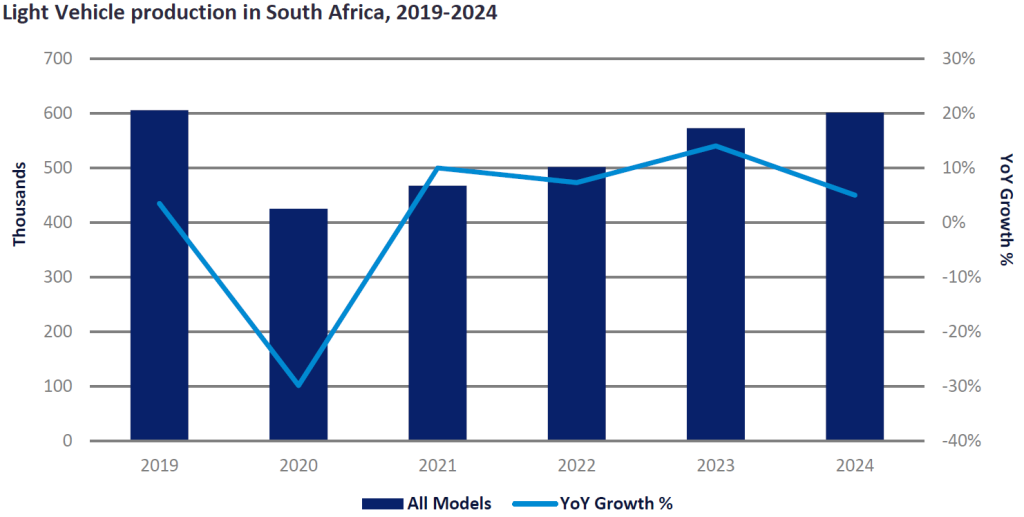Today, South Africa is recognised as the largest producer of automotive vehicles on the African continent, with the industry playing a pivotal role in economic growth, employment, and international trade. This sector has evolved into a sophisticated and highly competitive player in the global market. This article gives an overview of the current state of automotive production in South Africa, its prospects, and its challenges, with a closer look at whether it is ready to shift towards the production of Battery Electric Vehicles (BEVs).
The South African automotive industry is dominated by subsidiaries of major OEMs, including BMW, Ford, Toyota, and Volkswagen. These companies have established manufacturing plants in South Africa, allowing it to become a key manufacturing hub, exporting vehicles and components to over 150 countries. South African Light Vehicle production grew by a huge 14% year-on-year (YoY) in 2023. For 2024, we envisage 5% YoY growth.


Several key factors are driving output growth in South Africa’s automotive industry over the coming years. For example:
- Strategic location: South Africa’s geographic position makes it an ideal gateway for vehicle exports to other African countries and markets in Europe and Asia. Exports have accounted for more than 60% of total vehicle production in recent years.
- Robust infrastructure and skilled workforce: Advanced infrastructure, including modern ports, railways, and road networks, supports efficient logistics and supply chain management, alongside a well-trained workforce, with numerous technical training programmes dedicated to automotive engineering and manufacturing.
- Components industry: South Africa has a robust manufacturing sector that supplies the domestic market and exports tyres, engine parts and other essential components.
Challenges and opportunities
Despite its strengths, the South African automotive industry faces several challenges, including economic volatility, labour strikes, and global supply chain disruptions. However, these challenges also present opportunities for innovation and growth, such as workforce upskilling, research and development, strategic partnerships, and local expansion into new markets.
Expanding into those markets, particularly within Africa, offers significant growth potential. More recently The African Continental Free Trade Area (AfCFTA) agreement could play a crucial role in this expansion by reducing trade barriers and fostering intra-African trade.
So… how ready is South Africa for BEV production?
South Africa stands at a pivotal point regarding its readiness to embrace BEV production. Several aspects influence the country’s capacity to transition to and establish itself as a significant player in the battery electric market. Whilst South Africa has abundant resources of minerals like lithium, cobalt, and manganese, essential for battery production, it lacks a robust supply chain for BEV-specific components such as battery cells and electric drivetrains. Developing local manufacturing capabilities and attracting investment in battery production would be critical. Relying heavily on imported parts could also lead to supply chain disruption and higher production costs.
Significant investment is required to set up BEV manufacturing plants and related infrastructure. The relatively high cost of electric vehicles compared to internal combustion engine vehicles may limit consumer demand. The South African government has implemented various initiatives to support the automotive industry, such as the Automotive Production and Development Programme (APDP), which provides incentives for local production and investment, however, the government needs to enhance its support for the BEV sector through policies and incentives that promote adoption, including subsidies for BEV manufacturers and buyers. Opportunities also exist for strategic partnerships with global battery electric vehicle producers to leverage existing facilities and expertise in the region.
While South Africa is not fully equipped at present, it has significant potential to develop its BEV production capabilities by addressing key challenges and embracing its opportunities. As the global automotive industry shifts towards Electric Vehicles, South Africa could become the continent’s leader in BEV production. Investments in related infrastructure and manufacturing capabilities could position the country as a key player in this emerging market.
Zakia Subhan, Analyst, GlobalData
This article was first published on GlobalData’s dedicated research platform, the Automotive Intelligence Center.







